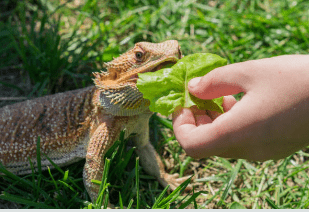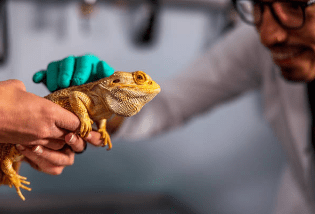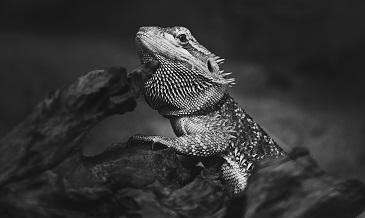Wondering why your bearded dragon is channeling its inner dark knight?
You’re not alone, and as a seasoned herpetologist, I’ve got the lowdown for you.
We’ll explore why your bearded dragon is black or why its beard is taking on darker shades.
Hold on to your scales; you’re in for an enlightening read!
You’ve likely heard that a black bearded dragon isn’t necessarily a bad sign.
But just as you wouldn’t ignore a strange mole, you shouldn’t disregard this hue shift either.
Our scaly pals can’t vocalize, so sometimes color is their canvas for communication.
Don’t worry; we’ll decode the meanings for you, from potential causes to necessary care steps.
By the end of this article, you’ll be a veritable Sherlock Holmes of bearded dragon coloration.
Now, let’s jump right into this fascinating palette of possibilities.
Table of Contents
Overview of Bearded Dragon Coloration
Bearded dragons are fascinating creatures with a palette of colors and patterns. Their skin’s colors can vary due to multiple factors, including mood, health, and environment. But what about the black color? Is it a fashion statement, or is there more to it?
Is Black Color Normal for Bearded Dragons and Why Does It Appear?
Don’t fret; a bearded dragon beard black isn’t necessarily a cause for alarm. The color black can be a sign of various conditions or emotions. Your dragon isn’t a mood ring, but its color can offer clues about its well-being.
15 Possible Reasons Why Bearded Dragons May Turn Black
These color-changing lizards don’t shift hues randomly. Understanding why your bearded dragon’s beard turns black can prevent unnecessary worry. So, let’s dig into these 15 possible reasons to get you well-versed in the subject.
Temperature Regulation
Firstly, one of the most common reasons your black bearded dragon may darken its hue is temperature regulation. When it’s chilly, a darker color allows for better absorption of heat. So, if you’ve ever wondered, “Why is my bearded dragon black?”, this could very well be the answer.
Cooling Down
Contrarily, if your bearded dragon is feeling too warm, a darkened hue can also assist in cooling down. A dark color can actually help to dissipate heat when your pet seeks a shady spot. Yes, color serves a dual purpose here!
Stress or Fear Response
If there’s a new toy, object, or even a new pet in the house, your bearded dragon might turn black out of stress or fear. Stress is one of the prime reasons a bearded dragon’s beard turns black.
Threat Display
A bearded dragon might turn black to look more threatening to perceived predators. It’s their way of saying, “Hey, I’m not as small as you think; beware!”
Breeding Season
If it’s that time of the year, males can turn a darker shade to attract females. Especially if you’ve been wondering, “Why is my female bearded dragon turning black?”, this breeding-season change might answer your question.
Hormonal Changes
Both male and female bearded dragons may experience hormonal fluctuations that lead to color changes. Especially in younger dragons, hormonal changes can significantly affect their coloration.
Dominance Displays
In multi-dragon environments, one dragon may turn black to signal dominance over the others. It’s a bearded dragon’s way of saying, “I’m the boss around here, listen up!”
Aggression
If you’ve got a cranky bearded dragon on your hands, it might display aggression by darkening its color. A black bearded dragon can be a red flag that something’s not right, emotionally speaking.
Illness or Injury
If you notice that your bearded dragon’s beard stays black for an extended period, this could signify an underlying health issue. Whether it’s an illness or injury, it’s crucial to consult a vet.
Skin Shedding
As your bearded dragon prepares to shed its skin, you’ll often notice it darkening. The darkening happens before the actual shedding, almost like a prelude to the main event.
Sleep or Relaxation
When your dragon sleeps, you might find its color darkening. In some cases, a black bearded dragon simply signifies a relaxed and deeply resting pet. It’s pretty much the dragon equivalent of us lounging in pajamas.
Environmental Changes
New environment? Your bearded dragon might respond with a color change. If you’ve recently moved and find yourself wondering, “Why is my bearded dragon black?”, it could be adjusting to its new surroundings.
Dietary Changes
Poor diet or a sudden change in diet can cause your bearded dragon’s beard to turn black. If you’re asking, “Why is my bearded dragon black?” take a closer look at its meals.
Genetic Variations
Some bearded dragons are just born darker due to genetic factors. They may naturally possess more melanin, making them darker than other bearded dragons. So if you’ve adopted a darker dragon, genetics could be why.
Personal Temperament
Finally, much like humans, every bearded dragon has its own personality. What causes one dragon to turn black may not affect another. The temperament of each dragon can play a significant role in its color changes.
Understanding Melanin and Pigmentation
The question, “Why is my bearded dragon black?”, often circles back to one fundamental component: melanin. Understanding melanin and pigmentation can unravel the mystery behind your bearded dragon’s various shades.
Here’s a straightforward guide:
- What Is Melanin?: Melanin is a natural pigment found in the skin, hair, and eyes of many animals, including bearded dragons. It’s the primary factor responsible for the color variations in these creatures.
- Melanin Production: When melanocytes, the cells responsible for melanin production, become active, they can cause the skin to darken. This is often why you might find a bearded dragon beard black basking in the sun or undergoing stress.
- Hormonal Influence: Hormones like adrenaline can trigger melanocytes. That’s why when your bearded dragon is stressed or frightened, you’ll often see its beard turn black.
- Environmental Factors: UV rays and temperature are known to influence melanin production. Your dragon’s habitat plays a critical role in determining its coloration.
- Age and Genetics: Younger bearded dragons and certain genetic strains may naturally produce more melanin, resulting in a darker hue.
Care Tips if Your Bearded Dragon Turns Black
Alright, so you’ve deciphered the cryptic color code of your bearded dragon. Now what? Here’s the game plan to keep your scaly companion not just surviving but thriving.
Let’s zoom into the nitty-gritty.
Increase Temperature and Humidity Levels
If your bearded dragon beard black is darkening due to cold, amp up the heat and humidity. A basking spot with temperatures around 95-110°F is ideal. Maintain humidity at 20-40% to keep your dragon comfortable.
Improve the Quality of the Diet
Are you feeding your dragon a low-quality diet? Poor nutrition can stress them out, causing color changes. Ensure you include a balanced mix of vegetables, fruits, and protein sources like crickets and mealworms.

Make Sure That The Bearded Dragon Has Access to a Variety of Foods
Variety is the spice of life, even for your bearded dragon. Offer a range of fruits, veggies, and insects to keep their diet diverse. It helps in getting them the nutrients they need, possibly reducing stress and that black beard.
Provide The Proper Lighting and Heat Sources
One word: UVB. Bearded dragons require UVB lighting for proper bone health and metabolism. Combine this with a reliable heat source, and you’re golden—or rather, your dragon is.
Regularly Monitor your Bearded Dragon’s Health
Keeping tabs on your pet’s health is essential. Regularly check for signs of stress, illness, or injury. Any of these can cause a bearded dragon’s beard to turn black, so vigilance is key.
Vet Check-Ups If Necessary
If you’ve tried all the above, and your bearded dragon’s beard remains black, it’s time to call in the pros. A vet check-up can rule out underlying health issues and offer a tailored care plan for your pet.

Conclusion
So, the next time you find yourself wondering, “Why is my female bearded dragon turning black?” you’ll have some answers. Understanding your bearded dragon’s color changes is an essential aspect of responsible pet care.
It might seem daunting, but with the right information and attention, it doesn’t have to be. Good luck, dragon tamers!
FAQs
Is it normal for my bearded dragon to turn black?
Yes, it’s generally normal and can be due to various factors like temperature regulation, stress, or even breeding season.
Why is my female bearded dragon turning black?
Female bearded dragons may turn black due to stress, hormonal changes, or environmental factors like temperature and humidity.
Should I be concerned if my bearded dragon’s beard turns black and stays that way?
A persistently black beard could be a sign of underlying stress, illness, or injury and may warrant a vet check-up for proper diagnosis and care.
Alina Hartley is a small-town girl with a ginormous love of bearded dragons. It all started with Winchester, a baby bearded who was abandoned at the shelter by his former owners because of a birth defect that caused one front leg to be shorter than the other. Alina originally went to the shelter looking for a guinea pig, but one look at Winchester and it was love at first sight. From that day on, Alina has dedicated her life to learning everything she can about bearded dragons. She loves helping new beardie parents start their incredible journey with these magnificent reptiles.
Follow her on:
LINKEDIN
TWITTER.
Read her latest articles HERE
Learn more about her HERE.

